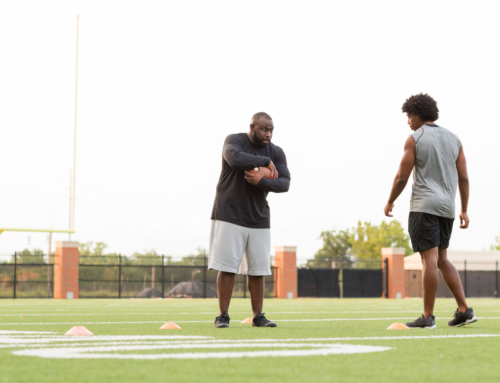See how you can make the first step to making a good first impression.
While it may not mean much in the big picture, a football questionnaire is an important element in the recruiting process. And whether you receive one from a coach or you’re asked to fill one out via a school’s athletic department website, the information you provide is often the first impression a college coach will have of you and your interest in that school.
While a questionnaire will rarely decide your chances of a scholarship offer, ignoring them can limit the offers you receive. And, even if you’re not interested in a school, if a coach takes the time to send it to you, you should always fill out any questionnaire you receive.
What The Questionnaire Does
Regardless of how a questionnaire winds up in front of you, its primary function is to show your interest in a program and to get you on a coach’s recruiting radar. If you receive a questionnaire from a coach, it doesn’t necessarily mean that a school is ready to offer you a scholarship. Conversely, not receiving a questionnaire doesn’t indicate a coach’s lack of interest in you. Instead, it may simply mean you’re not on a coach’s radar yet or a program prefers to host questionnaires on their own website and leave it to recruits to take the initiative and fill them out on their own.
Whatever the circumstances of how a football questionnaire gets in front of you, consider it simply the first step in the “getting-to-know-each-other” process. It’s essentially a football coach or program saying “Tell me about yourself,” in questionnaire form as well as a way to supply your contact information and basic details.
While they may vary from school to school, most football questionnaires will ask for basic information such as your mailing address, phone number(s), email address, graduation year, and social media profiles. While all of the above is pretty simple, make a note to clear out any Twitter, Facebook, or Instagram content that is derogatory, degrading, disrespectful, illegal or illicit. If you’re not sure about something, err on the side of caution and delete it. Assume everything you post will be public and will be seen by college coaches, even if all your accounts are private. Then, keep all your future social media content focused on promoting your athletic abilities to recruiters.
On top of your basic contact info, most questionnaires will want to know your height and weight, position, experience, your high school coach’s contact info, and other related performance information. There are no wrong answers, but being as thorough as possible will show coaches you’re making an effort, and that will make a much stronger impression than a questionnaire with the least amount of input possible.
Why You Should Fill Out Every Questionnaire
As mentioned above, filling out a football questionnaire shows a coach that you at least have some level of interest in their program. If you receive a questionnaire from a coach and you don’t take the time to fill it out, you not only make it more difficult for a coach to contact you, you also send out a pretty good sign that you’re not interested in that program.
Whatever your level of interest in a particular school, you should still fill out every questionnaire that you receive specifically because things can and do change. Don’t rule any school out early on for any reason. Remember that today’s offensive coordinator at a school you’re not interested in could be the head coach at your dream school tomorrow. You may aspire to a Division I school but you may fit in better athletically in DII. Alternatively, you may make a huge physical and performance leap between your junior and senior seasons and suddenly more DI schools will want to get ahold of you.
Finally, if you’re not receiving many questionnaires from schools you’re interested in, going to the website or even calling the coach and asking for one is a good way to get on a coach’s recruiting radar. The data you provide in those questionnaires will help coaches get a feel for you and what you can offer their program. And, by starting the ball rolling on your own, you show a coach that you want to be part of that program.
What Else Can A Questionnaire Do?
In this day and age, many questionnaires are online and you can fill them out quickly and easily. In addition, many online forms allow you to edit and update as needed, which is helpful as it allows you the opportunity to keep your current. Those updates can include your GPA, standardized test scores, physical growth and capabilities, and stats. That’s especially important if you filled out a questionnaire as a high school freshman or sophomore.
Some schools still mail questionnaires for you to fill out by hand. It may take a little extra time, but manually filling out can show you’re happy to work a little harder to show your interest in a given program.
Finally, keep an eye on coaching changes at any school where you’ve filled out a questionnaire. Should coaches change, always to check in with the new staff members to see if you need to re-submit the questionnaire. Doing so will help you introduce yourself to the new staff and confirm for them your interest in the program.
In the grand scheme of things, filling out a football questionnaire likely won’t be the one thing that helps you land a scholarship. However, the effort you put in can help put your best foot forward with college coaches. But if you ignore a coach’s questionnaire, you effectively tell a coach you’re not interested or that his program isn’t worth your effort. And that will derail any chance of a scholarship at that school. Are you willing to take that chance?
Did you enjoy the article ‘Why The Football Recruiting Questionnaire Is Important’? If so, check out more of our articles HERE.




